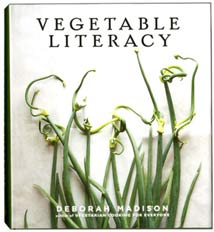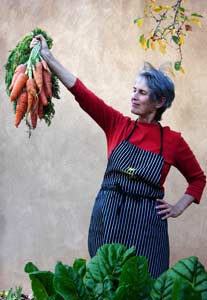
Part 1: Veteran food author Deborah Madison’s new cookbook Vegetable Literacy draws inspiration for its recipes directly from the garden. Growing a variety of one’s own plants in a food garden, and witnessing what they look like through their various stages of growth provides distinct advantages in the kitchen. “Because the garden is the other side of the kitchen, it helps to have some ideas about how to use what we grow, how plants relate to one another on the plate as well as the garden bed” …”I’m convinced that the garden helps us cook better, more easily, and, ultimately, more deliciously,” says Madison on the jacket cover of her new book.
Deborah Madison’s distinguished career as a chef began while a student at the San Francisco Zen Center where she held various chef positions including head cook. In 1977, she joined Berkeley’s Chez Panisse restaurant, and two years later, opened Green’s Restaurant across the bay in San Francisco. Over the succeeding years that Madison was involved at Green’s, her restaurant earned international respect for its diverse vegetarian cuisine sourced fresh from local farms and farmer’s markets.
Despite growing up on mostly a plant-based diet, Madison never considered herself a strict vegetarian. When she became more of a public figure as a result of her books, she felt a personal obligation to distance herself from promoting that lifestyle, and declared publicly not to be a vegetarian. “I didn’t want the focus to be on pushing something away, on not eating meat, I’m always more interested in trying to work with situations, and having everybody at the table, and now I think that has started to happen,” Madison explained during our interview.
Vegetable Literacy is first and foremost a cookbook. But it offers us so much more than just wonderful recipes for making plant based meals. Madison’s book delivers a treasure trove of edible plant members, identified, described, and thoughtfully expounded upon, within each of the 12 edible botanical families selected for the book. And while on the surface, many of us who see ourselves more as cooks than gardeners may know what to do with fresh carrots, we might not realize that within the same family (carroway seed, anise seed, dill, cumin, coriander, and more), there exists a complimentary range of ingredients that also can be added to the dish. Or how about this exotic sounding recipe, Creamy Cardoon Soup with Thyme that combines Cardoons from the sunflower family with thyme from the mint family?
Vegetable Literacy celebrates the familial wonder of the garden, and the variety of ways plants can be used together in the kitchen, providing a kind of decoder ring, translating the almost infinite possibilities of the garden into the practical realm of cooking.
Stay tuned on Wednesday for part 2 of our interview with Deborah Madison as she describes several of the 12 edible plant families in her book.
Most of the videos featured on Cooking Up a Story were produced, filmed, and edited by Rebecca Gerendasy. Fred Gerendasy contributed as a writer to many of the posts and occasionally as the interviewer. Visit Rebecca Gerendasy Clay – Art and Fred Gerendasy Photography to see their current work.

